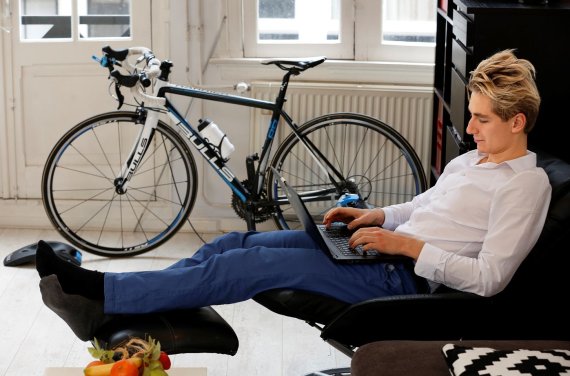The student from Amsterdam came to Wageningen in 2015 for a Bachelor’s in Biotechnology, followed by a Master’s in Aquaculture and Marine Resource Management, specializing in Marine Ecology. ‘After Biotechnology, I wanted to do more research and fieldwork. Biotechnology is very industry-oriented and you are trained for a job in the private sector. That’s nice — for example, I worked at the Netherlands Institute of Ecology for my thesis — but I wanted more field experience. I’ll graduate in August.’ Westerman Holstijn is taking part in the literary competition organized by 16 academic and applied university magazines, including Resource. As Resource’s winner, he will get professional support from a literary agency. The winner of the nationwide final will get their own literary agent. The competition is being held for the first time.
So you have a love for literature in addition to your degree subject?
‘Yes, that started at secondary school in Amsterdam. I loved reading and I was always interested in stories such as the myths of Hercules and the Trojan War — I loved all that. I also liked reading fantasy, for example by Robin Hobb and George R.R. Martin. I enjoyed Eoin Colfer too. At primary school, I turned one of his books into a play. But I basically read anything I could get hold of.’
When did you start writing?
‘I started writing short stories at secondary school. I often have several ideas I think would be interesting to turn into a story. In a novel you have to have interconnected circumstances but you have a little more freedom in a short story. So far, that’s worked better for me.’
Or you can’t choose…
‘No, it’s not that. It is easier to get started — you just begin. Also, writing a short story is an art in itself: literature down to the last inch, and each story has to have a beginning and an end. Where exactly does my inspiration come from? A lot of things can affect me. A little cottage surrounded by fields, for example. My imagination immediately runs riot and I start making notes. Then I get writing. Sometimes it goes quickly; sometimes it’s a slow process.’
Studying in Wageningen and writing fiction: worlds apart, surely?
‘Not really. I actually enjoy incorporating topics that I learn about or encounter here in my fiction. My story Droogte, for example, is about nature and someone who has to adapt to extreme circumstances. The vagaries of nature and the weather are Wageningen themes. It is fun to stretch your scientific knowledge until you’re almost in science fiction territory. How far can you go before it becomes unbelievable? Like the work of Daan Remmerts de Vries or Belcampo, two of my role models.’
About Droogte
Droogte is a magical realist and slightly absurdist short story about how someone deals with factors they have no control over. The story is about a man living alone in the desert. He is used to surviving on minimal resources; with the help of some barrels of water, he is keeping himself alive until hopefully the rains return. His house is so remote that even the animals don’t come near, but then another person turns up unexpectedly. The recluse is confronted all of a sudden with the difficulties inherent in a life that is not solitary.
The jury on Droogte
Droogte is an intriguing and original work that grips you from the start. Mauk Westerman Holstijn uses just the right words to create a subtle and at times disorienting atmosphere, according to the jury report. Jury member Geert van Zandbrink: ‘He skilfully slows down the narrative with descriptions, flashbacks and inner thoughts, which gives you plenty of room to become caught up in the story. This is a very accomplished achievement.’ WA
The writing competition jury consisted of Louise O. Fresco (President of the Executive Board), marine biologist Lisa Becking, student and author Geert van Zandbrink and Willem Andrée (editor-in-chief of Resource and Wageningen World).

 Photo: Aldo Alessi
Photo: Aldo Alessi